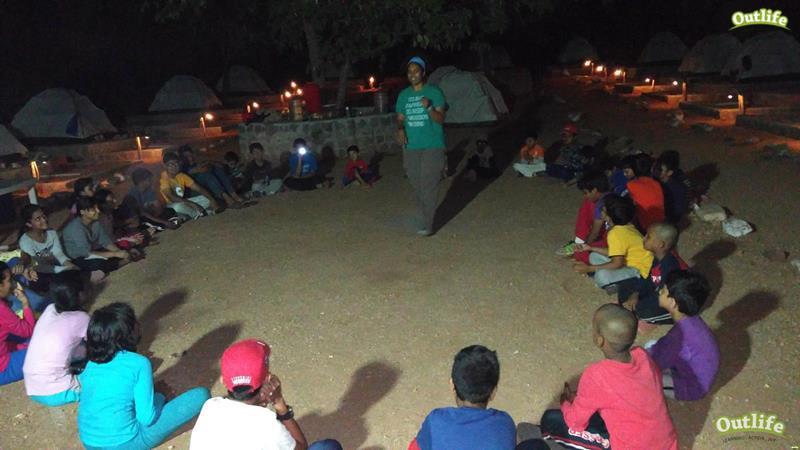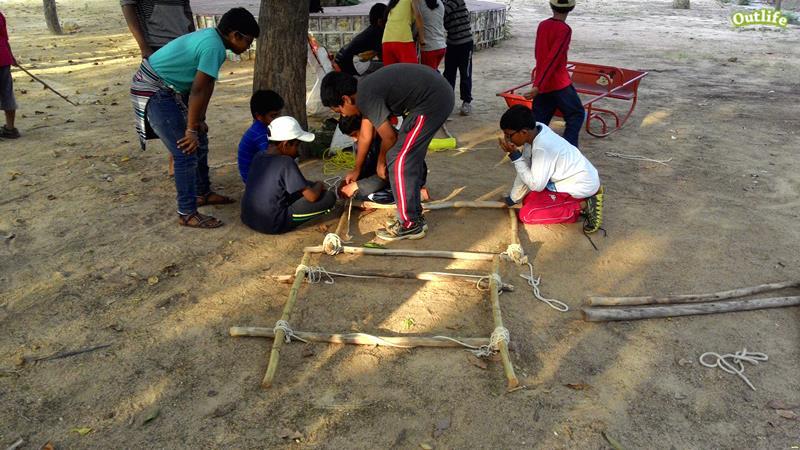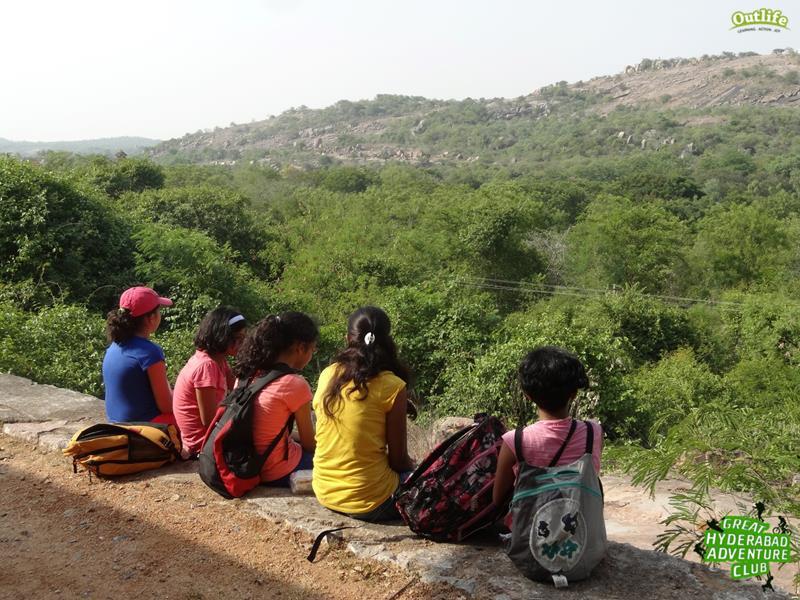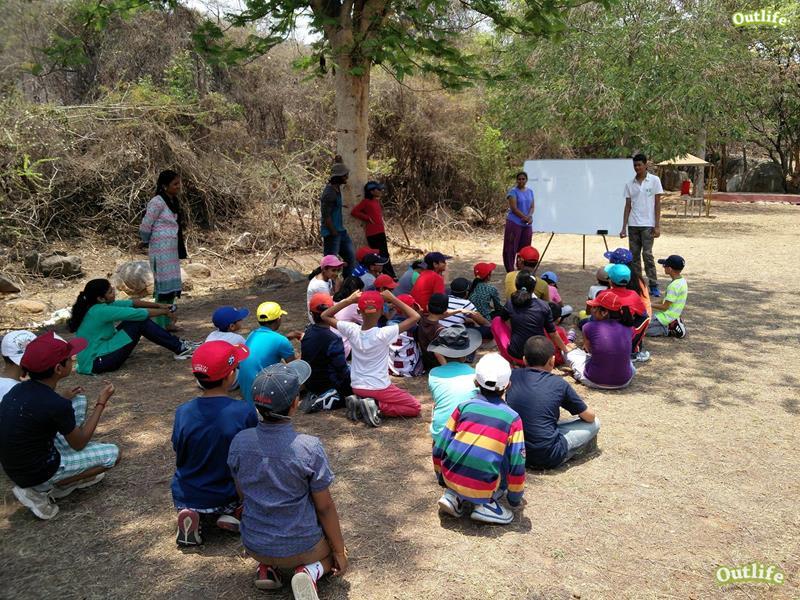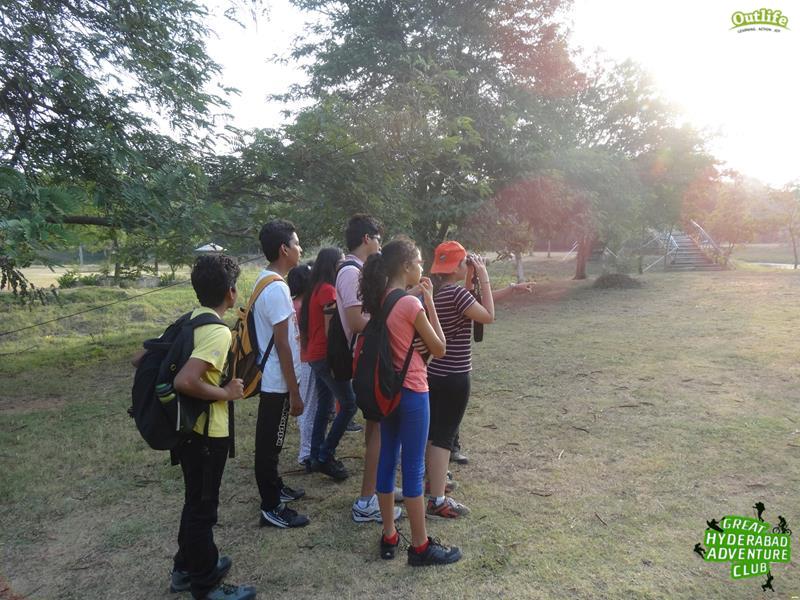Experiential Learning in School EducationExperiential learning is a hands-on approach to education that allows school children to actively engage in their own learning process. This method of teaching and learning focuses on the student's direct experiences. It encourages them to connect their new knowledge to their current world understanding. This approach to education is becoming increasingly popular in schools as educators and researchers recognize its many benefits.
One of the key benefits of experiential learning is that it allows school children to learn at their own pace. Instead of being confined to a set curriculum, children are free to explore and discover new information on their own terms. This approach can be particularly beneficial for children who struggle with traditional classroom learning. Another benefit of experiential learning is that it allows children to learn in a way that is meaningful and relevant to their lives. By connecting new information to real-world experiences, children can understand the relevance of their learning and see how it applies to their own lives. This approach can increase their motivation and engagement in learning. Experiential learning helps students develop essential life skills, such as problem-solving, critical thinking, and teamwork. These skills are crucial for success in the modern world. By providing students with opportunities to practice them in a safe and controlled environment, schools can help prepares them for the challenges they will face later in life. The impact of experiential learning on school educationIn schools, experiential learning can revolutionize the way students learn and engage with the curriculum. Traditional classroom settings often limit opportunities for active participation and hands-on experiences. Experiential learning provides a solution by creating immersive and interactive learning environments.
By integrating experiential learning into the school curriculum, educators can create a more engaging and dynamic learning environment. Students become active participants in their own education, developing a love for learning and a thirst for knowledge that extends beyond the classroom. Experiential learning, facilitated by engaging experiences, has the potential to significantly impact education in various ways. One of the key benefits is the ability to cater to diverse learning styles and preferences. By providing variety of learning experiences, educators can engage visual, auditory, and kinesthetic learners simultaneously, ensuring that all students have the opportunity to learn in ways that resonate with them. When students are actively involved in their learning through hands-on experiences and interactive simulations, they are more likely to be motivated, curious, and enthusiastic about the subject matter. experience based learning often present students with complex scenarios and challenges, requiring them to think critically, make decisions, and apply knowledge in practical situations. This can lead to the development of essential skills that are highly valued in the workforce and in everyday life. Incorporating Experiential Learning in School EducationOne of the best ways to incorporate experiential learning into the classroom is through hands-on activities and projects. For example, a science class might use a hands-on activity to teach children about the water cycle. In contrast, a history class might use a project to help children understand the impact of a particular historical event. These activities allow children to actively engage in the learning process and make connections between new information and their own experiences.
Another way to incorporate experiential learning is through field trips and out-of-classroom experiences. Visiting a museum, a farm, or a historical site can provide children with a hands-on way to learn about a particular topic. These experiences also foster a sense of curiosity and wonder in children, which can be a powerful motivator for learning. Experiential learning deals with real-life complexity, where it helps the students see the interconnections and real-world dynamics. When students experience real-world challenges, they get engaged at the cognitive, emotional, social and physical levels. Experiential learning is mostly about doing where Learners learn best when working directly and involving their heads, hearts and hands into the experience. They experiment with new ideas and see the real-world consequences of their thinking and actions. Redefining Education through Experiential LearningStep into the future of education as we explore the transformative impact of immersive experiences on experiential learning. In our rapidly evolving digital age, traditional educational methods are being revolutionized by the integration of immersive technologies. Through virtual reality, augmented reality, and hands-on simulations, students are stepping beyond the confines of classrooms into dynamic, interactive learning environments.
Immersive experiences have the power to transport learners to different eras, geographical locations, or even microscopic dimensions, providing unparalleled opportunities for engagement and knowledge retention. This article delves into how these experiential learning techniques are reshaping the educational landscape, fostering deeper understanding and empathy among students. By embracing immersive experiences, educators can break down complex concepts, making learning more accessible and enjoyable. Students are no longer passive recipients of information but active participants in their learning journey. readon to uncover how these cutting-edge methods are not just enhancing education but fundamentally redefining the way knowledge is acquired and absorbed. Introducing immersive experiences in educationImmersive experiences in education refer to the integration of technologies such as virtual reality (VR), augmented reality (AR), and simulations and expereinces to create interactive and engaging learning environments.
These technologies aim to provide students with immersive experiences that go beyond traditional classroom settings, allowing them to explore, interact, and learn in ways that were previously not possible. The goal is to enhance learning outcomes by making education more engaging, interactive, and impactful. The use of immersive experiences in education is based on the principle that students learn best when they are actively engaged and when learning is contextualized and relevant to real-world applications. By providing students with opportunities to experience and interact with subject matter in a three-dimensional and interactive way, educators can enhance understanding, retention, and application of knowledge. The potential of immersive experiences in education extends beyond just the acquisition of knowledge. These technologies also have the capacity to foster empathy, cultural understanding, and emotional engagement by allowing students to experience different perspectives and scenarios firsthand. Ways to implement experiential learning at schoolThere are several different ways that schools can incorporate real-world experiential learning into their curriculum. Some examples include:
Field trips: Taking students to museums, historical sites, or nature preserves can provide hands-on learning opportunities and help students connect abstract concepts to real-world experiences. Community Service Learning projects: Encouraging students to participate in community service projects can help them develop skills such as problem-solving, teamwork, and leadership, as well as give them a sense of civic responsibility. Project-based learning: Assigning students long-term projects that involve research can help them develop critical thinking and problem-solving skills. Students also get to learn how to apply their knowledge of real-world situations. Simulation and role-playing: Simulation and role-playing exercises can help students understand complex concepts and develop critical thinking skills. Role-playing: Acting out different scenarios or situations to understand different perspectives and experiences. Outdoor education: Learning through activities such as hiking, camping, or rock climbing in natural environments. Internships and apprenticeships: Providing students with opportunities to work in real-world settings can give them valuable hands-on experience and help them explore different careers. Debate or mock trials: Engaging in a formal debate to practice critical thinking and public speaking skills. Collaborative learning: Encouraging students to Work in small groups or teams can help them develop social and communication skills and learn how to solve problems and collaborate effectively. Self-directed learning: Allowing students to take charge of their learning by setting goals, designing projects, and seeking resources can help them develop self-motivation, self-directness, and problem-solving skills. Science Investigations: Students conduct experiments and investigations to learn about scientific concepts and principles. Environmental Studies: Students learn about the natural environment and conservation efforts through hands-on projects and field trips.Entrepreneurship: Students learn about business and economics by starting and managing their own small businesses. Art and Design: Students learn about the creative process and design principles through hands-on projects in visual arts, music, theatre, and dance. Humanities: Students learn about literature, history, and culture through interactive projects and discussions.Technology: Students learn about coding, robotics, and other technologies through hands-on projects and workshops. Community Projects: This engages the students in community work while in school and bridges the gap between school and society. It prepares learners for real-life community involvement. Immersive Technology: Immersive learning technology uses Augmented reality and Virtual Reality technology to impart learning to students. |
Download our School Offerings
Contact Us | ||||||
Focus Areas of Experiential Learning Camps for Students
• Character Building,
• Team spirit,
• Trust Building,
• Enhancing Self Confidence
• Motivation and Achievement.
• Develop Self Reliance
• Develop Courage
• Spirit of Adventure
• Working in Teams
• Reflection and Sharing
• Service
• Cooperation
• Connecting with Natural World
• Exploration
• Overcome Challenges
• Skill Building
• Team spirit,
• Trust Building,
• Enhancing Self Confidence
• Motivation and Achievement.
• Develop Self Reliance
• Develop Courage
• Spirit of Adventure
• Working in Teams
• Reflection and Sharing
• Service
• Cooperation
• Connecting with Natural World
• Exploration
• Overcome Challenges
• Skill Building
Benefits of Experiential Learning for students
The adoption of experiential learning in school education offers numerous benefits for students across various age groups and academic disciplines. One of the primary benefits is the enhancement of engagement and motivation. Experiential Learning captivate students’ attention, spark curiosity, and create a sense of excitement and wonder, leading to increased enthusiasm for learning.
Furthermore, immersive experiences have the potential to improve knowledge retention and understanding. By allowing students to interact with concepts in three-dimensional and interactive environments, these experiences enable deeper levels of comprehension and memory consolidation. Students are more likely to remember and apply knowledge that they have actively engaged with through immersive experiences.
Another significant benefit is the development of essential skills, including critical thinking, problem-solving, and collaboration. Immersive experiences often present students with challenges and scenarios that require them to think critically, make decisions, and work together with peers, fostering the development of skills that are valuable in both academic and professional contexts.
Moreover, immersive experiences can cultivate empathy and cultural understanding by providing students with opportunities to experience different perspectives, cultures, and environments. This can contribute to the development of global awareness, empathy, and a broader worldview among students.
Furthermore, immersive experiences have the potential to improve knowledge retention and understanding. By allowing students to interact with concepts in three-dimensional and interactive environments, these experiences enable deeper levels of comprehension and memory consolidation. Students are more likely to remember and apply knowledge that they have actively engaged with through immersive experiences.
Another significant benefit is the development of essential skills, including critical thinking, problem-solving, and collaboration. Immersive experiences often present students with challenges and scenarios that require them to think critically, make decisions, and work together with peers, fostering the development of skills that are valuable in both academic and professional contexts.
Moreover, immersive experiences can cultivate empathy and cultural understanding by providing students with opportunities to experience different perspectives, cultures, and environments. This can contribute to the development of global awareness, empathy, and a broader worldview among students.
The role of educators in facilitating experiential learning
Educators play a pivotal role in facilitating experiential learning by serving as guides, facilitators, and mentors for students as they engage with immersive aspects of EL. In the context of experiential learning, educators are responsible for designing and curating immersive experiences that align with educational objectives and support student learning.
Furthermore, educators must provide guidance and context for students as they navigate learning from experiences, helping them make connections between the learning environment and real-world concepts. This may involve facilitating discussions, reflection activities, and debriefing sessions to ensure that students extract meaningful insights and learning from their immersive experiences.
In addition to instructional responsibilities, educators also have the opportunity to collaborate with technology specialists, content creators, and industry partners to develop innovative and impactful immersive learning experiences. By leveraging their subject matter expertise and pedagogical insights, educators can contribute to the creation of immersive content that is both educationally sound and engaging for students.
Furthermore, educators must provide guidance and context for students as they navigate learning from experiences, helping them make connections between the learning environment and real-world concepts. This may involve facilitating discussions, reflection activities, and debriefing sessions to ensure that students extract meaningful insights and learning from their immersive experiences.
In addition to instructional responsibilities, educators also have the opportunity to collaborate with technology specialists, content creators, and industry partners to develop innovative and impactful immersive learning experiences. By leveraging their subject matter expertise and pedagogical insights, educators can contribute to the creation of immersive content that is both educationally sound and engaging for students.
Involving Parents and Guardians in Students Learning
Experiential learning is not limited to just schools. Parents and guardians can also incorporate experiential learning into the home environment by encouraging their children to explore and discover new things independently by providing them opportunities to learn through experimentation and play.
This approach to learning can be as simple as encouraging children to support them with household chores or allowing them to explore the outdoors in the neighborhood. Parents can also engage the children in household work with safety and supervision.
Teachers at schools can collaborate with parents to bring experiential learning to the child's home. This partnership will go a long way in the teaching and learning process that involves curiosity and direct experience. By providing children with hands-on activities and other out-of-classroom experiences, teachers and parents can help to foster a love of learning and encourage children to become active participants in their own education.
Experiences from the local home and neighborhood context of the learner can serve as a source of teaching and learning. It helps the learners better understand their home and neighborhood and makes learning genuine, authentic and exciting.
This approach to learning can be as simple as encouraging children to support them with household chores or allowing them to explore the outdoors in the neighborhood. Parents can also engage the children in household work with safety and supervision.
Teachers at schools can collaborate with parents to bring experiential learning to the child's home. This partnership will go a long way in the teaching and learning process that involves curiosity and direct experience. By providing children with hands-on activities and other out-of-classroom experiences, teachers and parents can help to foster a love of learning and encourage children to become active participants in their own education.
Experiences from the local home and neighborhood context of the learner can serve as a source of teaching and learning. It helps the learners better understand their home and neighborhood and makes learning genuine, authentic and exciting.
Future trends in Experiential Learning for Schools
The future of experiential learning is marked by ongoing advancements in technology, expanding accessibility, and the integration of immersive experiences across diverse educational settings. As technology continues to evolve, immersive experiences are expected to become more sophisticated, realistic, and accessible, offering students increasingly immersive and interactive learning opportunities.
Furthermore, the integration of artificial intelligence (AI) and machine learning technologies into immersive experiences holds the potential to personalize and adapt learning content to individual students’ needs and preferences. AI-driven immersive experiences can analyze students’ interactions, responses, and performance, providing personalized feedback and adaptive content delivery.
Another future trend is the democratization of immersive technologies, making these experiences more accessible and inclusive for students from diverse backgrounds. As the cost of hardware and software decreases and the availability of educational content expands, immersive experiences are likely to become more widely adopted across educational institutions and disciplines.
Additionally, the integration of immersive experiences into online and remote learning environments is expected to grow, providing students with immersive learning opportunities regardless of their physical location or access to traditional educational settings. This trend is particularly relevant in the context of global events that impact traditional learning environments, such as the COVID-19 pandemic.
Furthermore, the integration of artificial intelligence (AI) and machine learning technologies into immersive experiences holds the potential to personalize and adapt learning content to individual students’ needs and preferences. AI-driven immersive experiences can analyze students’ interactions, responses, and performance, providing personalized feedback and adaptive content delivery.
Another future trend is the democratization of immersive technologies, making these experiences more accessible and inclusive for students from diverse backgrounds. As the cost of hardware and software decreases and the availability of educational content expands, immersive experiences are likely to become more widely adopted across educational institutions and disciplines.
Additionally, the integration of immersive experiences into online and remote learning environments is expected to grow, providing students with immersive learning opportunities regardless of their physical location or access to traditional educational settings. This trend is particularly relevant in the context of global events that impact traditional learning environments, such as the COVID-19 pandemic.
Power of Experiential Learning
Experiential learning is a powerful approach to education that can help children learn in a meaningful, relevant, and engaging way. Instead of simply memorizing facts and figures, students can use their knowledge in real-world situations. This learning approach helps them understand the curriculum material's relevance and importance and makes learning more exciting and engaging. It can also help students develop essential life skills and prepare them for the challenges they will face later in life.
By embracing experiential learning, educators have the potential to break down complex concepts, make learning more accessible and enjoyable, and foster a deeper connection between students and the subject matter. As technology continues to advance and immersive experiences become more prevalent, the transformative power of experiential learning in education is poised to shape the future of learning and knowledge acquisition for generations to come.
Consider incorporating experiential learning into your curriculum if you want to improve your teaching and learning process. Don't hesitate to contact us for a free consultation to discover ways experiential learning can support the teaching and learning process to improve student learning outcomes.
By embracing experiential learning, educators have the potential to break down complex concepts, make learning more accessible and enjoyable, and foster a deeper connection between students and the subject matter. As technology continues to advance and immersive experiences become more prevalent, the transformative power of experiential learning in education is poised to shape the future of learning and knowledge acquisition for generations to come.
Consider incorporating experiential learning into your curriculum if you want to improve your teaching and learning process. Don't hesitate to contact us for a free consultation to discover ways experiential learning can support the teaching and learning process to improve student learning outcomes.

